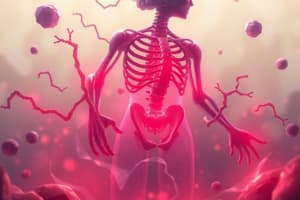Podcast
Questions and Answers
Što su peptidaze i koja je njihova osnovna funkcija?
Što su peptidaze i koja je njihova osnovna funkcija?
- Enzimi koji potiču sintezu proteina.
- Enzimi koji razgrađuju šećere.
- Enzimi koji inhibiraju metabolizam masti.
- Enzimi koji hydrolyziraju peptidne veze za oslobađanje pojedinačnih aminokiselina. (correct)
Koji hormon potiče sintezu proteina i inhibira njegovu razgradnju?
Koji hormon potiče sintezu proteina i inhibira njegovu razgradnju?
- Cortisol
- Rastni hormon
- Insulin (correct)
- Glukagon
Što označava pozitivna dušična ravnoteža?
Što označava pozitivna dušična ravnoteža?
- Sinteza proteina i razgradnja su u ravnoteži.
- Razgradnja proteina nadmašuje sintezu.
- Sinteza proteina nadmašuje razgradnju. (correct)
- Dugotrajna insuficijencija unosa proteina.
Koja od sljedećih bolesti utječe na metabolizam aminokiselina razgranatog lanca?
Koja od sljedećih bolesti utječe na metabolizam aminokiselina razgranatog lanca?
Koja je uloga proteina u tijelu?
Koja je uloga proteina u tijelu?
Koje funkcije proteini imaju u tijelu?
Koje funkcije proteini imaju u tijelu?
Što uključuje proces katabolizma u metabolizmu proteina?
Što uključuje proces katabolizma u metabolizmu proteina?
Koji proces pretvara amonijak u ureu?
Koji proces pretvara amonijak u ureu?
Što je 'pool' aminokiselina?
Što je 'pool' aminokiselina?
Koje aminokiseline moraju biti unesene hranom?
Koje aminokiseline moraju biti unesene hranom?
Koji proces omogućava pretvorbu genetskih informacija u proteine?
Koji proces omogućava pretvorbu genetskih informacija u proteine?
Koja od sljedećih izjava o obnavljanju proteina je točna?
Koja od sljedećih izjava o obnavljanju proteina je točna?
Koji su uvjeti pod kojima postaju esencijalne aminokiseline?
Koji su uvjeti pod kojima postaju esencijalne aminokiseline?
Flashcards
Peptidaze
Peptidaze
Enzimi koji razgrađuju peptidne veze i oslobađaju pojedinačne aminokiseline.
Fenilketonurija (PKU)
Fenilketonurija (PKU)
Genetski poremećaj koji utječe na metabolizam fenilalanina, što dovodi do nakupljanja fenilalanina u krvi.
Bolest javorovog sirupa urina (MSUD)
Bolest javorovog sirupa urina (MSUD)
Genetski poremećaj koji utječe na metabolizam razgranatih lančanih aminokiselina, što dovodi do nakupljanja tih aminokiselina u krvi.
Dušična ravnoteža
Dušična ravnoteža
Signup and view all the flashcards
Hormonska regulacija metabolizma proteina
Hormonska regulacija metabolizma proteina
Signup and view all the flashcards
Razgradnja proteina (katabolizam)
Razgradnja proteina (katabolizam)
Signup and view all the flashcards
Deaminacija
Deaminacija
Signup and view all the flashcards
Transaminacija
Transaminacija
Signup and view all the flashcards
Oksidativna deaminacija
Oksidativna deaminacija
Signup and view all the flashcards
Urejski ciklus
Urejski ciklus
Signup and view all the flashcards
Sinteza proteina (anabolizam)
Sinteza proteina (anabolizam)
Signup and view all the flashcards
Bazen aminokiselina
Bazen aminokiselina
Signup and view all the flashcards
Obnavljanje proteina
Obnavljanje proteina
Signup and view all the flashcards
Study Notes
Protein Metabolism Overview
- Protein metabolism encompasses the breakdown, synthesis, and utilization of proteins in the body.
- Proteins are vital for numerous bodily functions, such as structural support, enzymatic catalysis, and transport.
- Protein metabolism involves both catabolic and anabolic processes.
- Catabolic processes break down proteins into amino acids.
- Anabolic processes synthesize proteins from amino acids.
Protein Breakdown (Catabolism)
- Deamination: Removal of the amino group from amino acids.
- Transamination: Transfer of the amino group from one amino acid to another.
- Oxidative deamination: Amino acids are broken down, releasing nitrogen as ammonia.
- Urea cycle: Converts ammonia to urea, a less toxic nitrogenous waste product, for excretion.
- Carbon skeletons: The remaining part of the amino acid after deamination, further metabolized into carbohydrate and lipid intermediates.
- Fate of the carbon skeletons: Used for energy production, gluconeogenesis, or ketogenesis.
Protein Synthesis (Anabolism)
- Amino acid pool: A collection of amino acids circulating in the blood used for protein synthesis.
- Genetic code: Dictates the sequence of amino acids in proteins.
- Transcription and translation: Cellular processes converting genetic information into proteins.
- Protein folding: The process by which a polypeptide chain folds into its three-dimensional structure.
- Regulation of protein synthesis: Controlled by hormones, growth factors, and amino acid availability.
Protein Turnover
- Continuous process of protein synthesis and degradation.
- Crucial for maintaining cellular function and adapting to physiological needs.
- Rate of protein turnover differs among tissues and proteins.
- Damaged or unneeded proteins are degraded via the ubiquitin-proteasome system.
Amino Acid Classification
- Essential amino acids: Cannot be synthesized by the body and must be obtained from the diet.
- Non-essential amino acids: Can be synthesized by the body.
- Conditional amino acids: Non-essential, but become essential under specific conditions (like illness or stress).
Protein Digestion
- Proteins are initially broken down into smaller polypeptides by enzymes in the stomach and small intestine.
- Peptidases: Enzymes hydrolysing peptide bonds to release individual amino acids.
- Absorption of amino acids occurs in the small intestine.
Protein Metabolism Disorders
- Phenylketonuria (PKU): A genetic disorder affecting phenylalanine metabolism, causing phenylalanine buildup in the blood.
- Maple syrup urine disease (MSUD): A genetic disorder affecting branched-chain amino acid metabolism, leading to branched-chain amino acid accumulation.
- Other inherited metabolic disorders: Numerous inherited disorders can affect specific steps in protein metabolism, causing varied symptoms.
Hormonal Regulation
- Hormones impact protein metabolism through various mechanisms influencing synthesis, breakdown, and amino acid utilization.
- Insulin: Promotes protein synthesis and inhibits degradation.
- Glucagon: Stimulates protein degradation and gluconeogenesis.
- Growth hormone: Influences protein synthesis and growth.
- Cortisol: Affects both protein breakdown and synthesis depending on conditions.
Importance of Adequate Protein Intake
- Crucial for tissue growth, repair, and maintenance.
- Contributes to immune function, enzyme activity, and hormone production.
- Necessary for various bodily functions.
Special Considerations
- Nitrogen balance: Measures nitrogen intake versus excretion, reflecting protein status.
- Positive nitrogen balance: Synthesis exceeds degradation.
- Negative nitrogen balance: Degradation exceeds synthesis.
- Protein requirements vary by age, activity level, and health conditions.
Studying That Suits You
Use AI to generate personalized quizzes and flashcards to suit your learning preferences.




